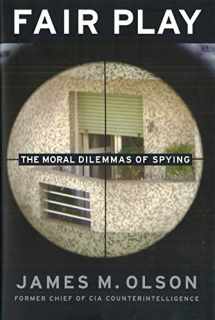
Fair Play: The Moral Dilemmas of Spying
Book details
Summary
Description
Revolutionary War officer Nathan Hale, one of America’s first spies, said, “Any kind of service necessary to the public good becomes honorable by being necessary.” A statue of Hale stands outside CIA headquarters, and the agency often cites his statement as one of its guiding principles. But who decides what is necessary for the public good, and is it really true that any kind of service is permissible for the public good?
These questions are at the heart of James M. Olson’s book, Fair Play: The Moral Dilemmas of Spying. Olson, a veteran of the CIA’s clandestine service, takes readers inside the real world of intelligence to describe the difficult dilemmas that field officers face on an almost daily basis. Far from being a dry theoretical treatise, this fascinating book uses actual intelligence operations to illustrate how murky their moral choices can be. Readers will be surprised to learn that the CIA provides very little guidance on what is, or is not, permissible. Rather than empowering field officers, the author has found that this lack of guidelines actually hampers operations. Olson believes that U.S. intelligence officers need clearer moral guidelines to make correct, quick decisions. Significantly, he believes these guidelines should come from the American public, not from closed-door meetings inside the intelligence community. Fair Play will encourage a broad public debate about the proper moral limits on U.S. intelligence activities.


We would LOVE it if you could help us and other readers by reviewing the book
Book review



